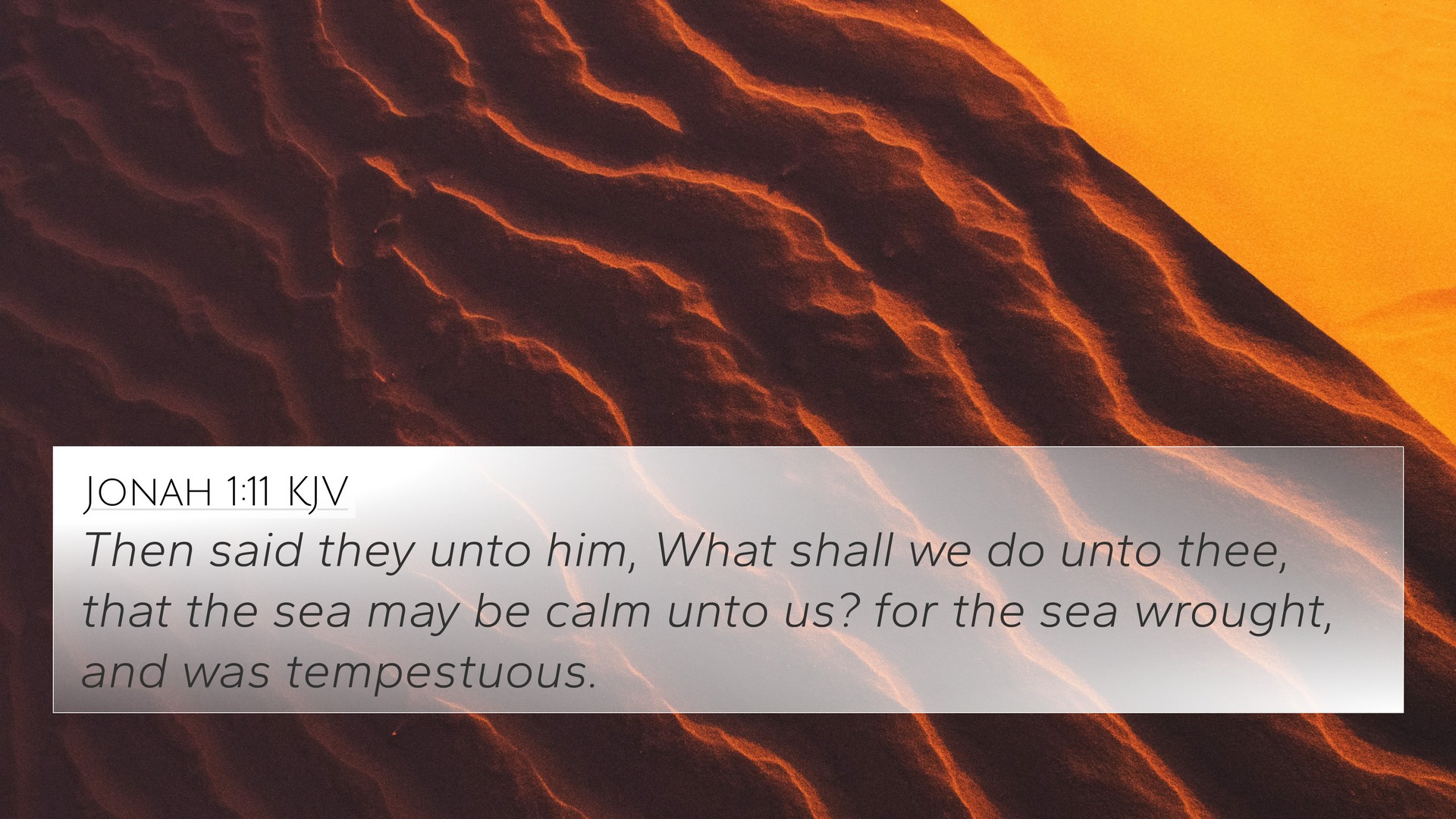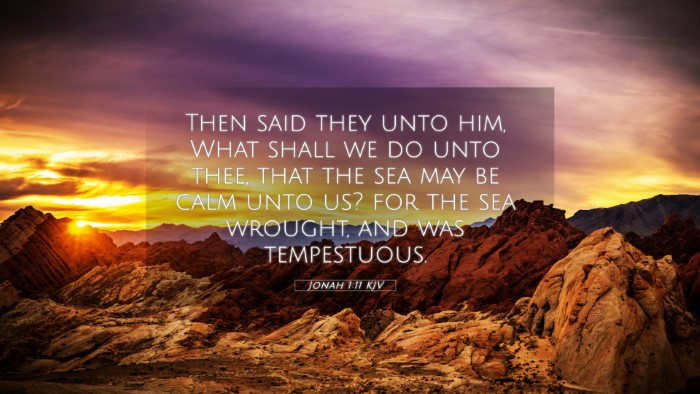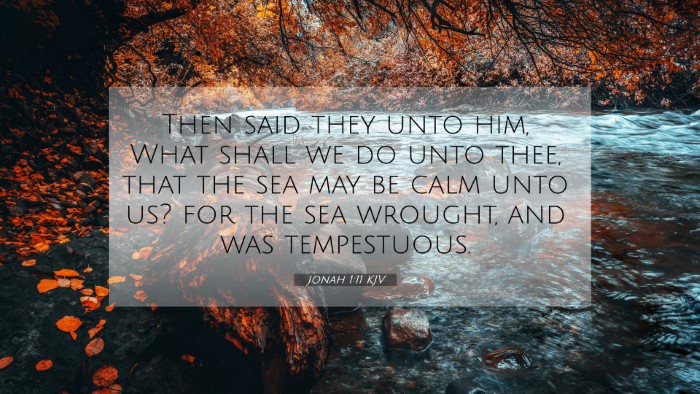Old Testament
Genesis Exodus Leviticus Numbers Deuteronomy Joshua Judges Ruth 1 Samuel 2 Samuel 1 Kings 2 Kings 1 Chronicles 2 Chronicles Ezra Nehemiah Esther Job Psalms Proverbs Ecclesiastes Song of Solomon Isaiah Jeremiah Lamentations Ezekiel Daniel Hosea Joel Amos Obadiah Jonah Micah Nahum Habakkuk Zephaniah Haggai Zechariah MalachiJonah 1:11 Similar Verses
Jonah 1:11 Cross References
Then said they unto him, What shall we do unto thee, that the sea may be calm unto us? for the sea wrought, and was tempestuous.
Uncover the Rich Themes and Topics of This Bible Verse
Listed below are the Bible themes associated with Jonah 1:11. We invite you to explore each theme to gain deeper insights into the Scriptures.
Jonah 1:11 Cross Reference Verses
This section features a detailed cross-reference designed to enrich your understanding of the Scriptures. Below, you will find carefully selected verses that echo the themes and teachings related to Jonah 1:11 KJV. Click on any image to explore detailed analyses of related Bible verses and uncover deeper theological insights.
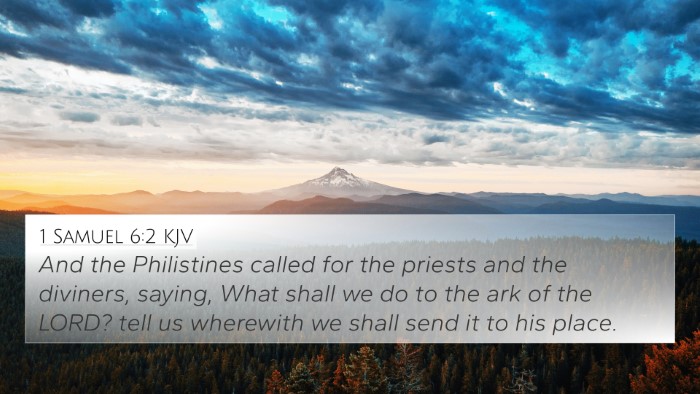
1 Samuel 6:2 (KJV) »
And the Philistines called for the priests and the diviners, saying, What shall we do to the ark of the LORD? tell us wherewith we shall send it to his place.
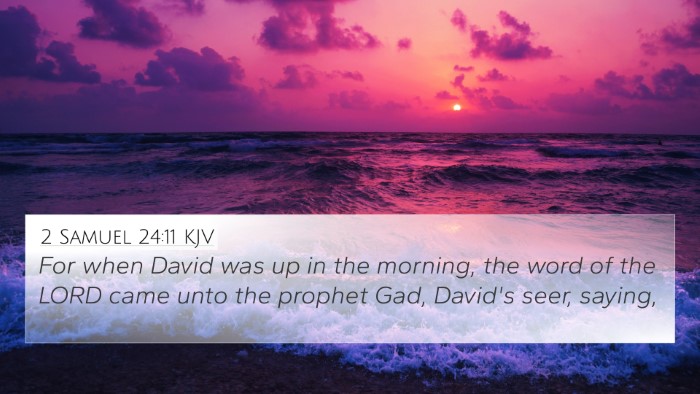
2 Samuel 24:11 (KJV) »
For when David was up in the morning, the word of the LORD came unto the prophet Gad, David's seer, saying,
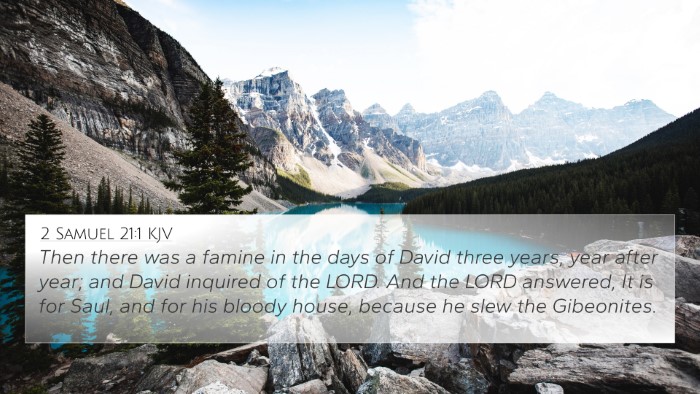
2 Samuel 21:1 (KJV) »
Then there was a famine in the days of David three years, year after year; and David inquired of the LORD. And the LORD answered, It is for Saul, and for his bloody house, because he slew the Gibeonites.
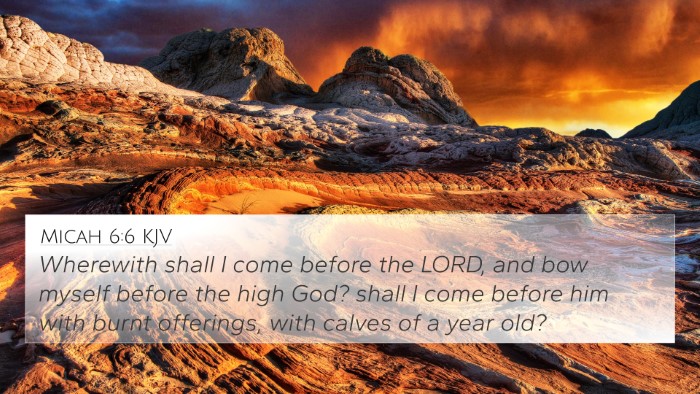
Micah 6:6 (KJV) »
Wherewith shall I come before the LORD, and bow myself before the high God? shall I come before him with burnt offerings, with calves of a year old?
Jonah 1:11 Verse Analysis and Similar Verses
Understanding Jonah 1:11
Jonah 1:11 reads, "Then said they unto him, What shall we do unto thee, that the sea may be calm unto us? For the sea wrought, and was tempestuous."
This verse highlights the desperation of the sailors and signifies a critical moment in the narrative of Jonah, illustrating the direct consequences of Jonah's flight from God's command.
Contextual Analysis
In the broader context of the Book of Jonah, this verse serves as a turning point. The sailors, who were initially unaware of Jonah's disobedience, seek to understand how to appease the tumultuous sea caused by Jonah's rebellion. Their question reflects a mix of curiosity and fear as they recognize that something beyond natural occurrences is at play.
Commentary Insights
- Matthew Henry's Commentary: Henry articulates that the sailors' plight represents the common experience of many who face storms in life. He emphasizes their collective decision-making in seeking a solution, illustrating human instinct to find control amid chaos.
- Albert Barnes' Commentary: Barnes points out the sailors’ acknowledgment of a higher power at work. Their inquiry suggests an awareness that divine intervention could be the key to restoring peace, highlighting the intersection of faith and human understanding.
- Adam Clarke's Commentary: Clarke notes the sailors’ questioning as indicative of desperation. Their dialogue represents the wrestling between understanding divine wrath versus human error—a theme resonant across Biblical narratives.
Thematic Connections in Scripture
This narrative presents various thematic connections within the scripture, emphasizing the motifs of disobedience, divine authority, and the complexity of human responses to divine will. When utilizing tools for Bible cross-referencing, one may note that this situation parallels several key verses:
- Matthew 8:26: Jesus calming the storm, which reflects God’s authority over nature.
- Psalms 107:28-29: The psalmist discusses calling upon the Lord in trouble, and He calms the storm, showcasing divine intervention in crises.
- Ephesians 4:30: The consequences of grieving the Holy Spirit parallel Jonah's disobedience leading to turmoil.
- Acts 27:27-37: The shipwreck of Paul and the divine assurance parallels Jonah's journey and God's continued involvement.
- Proverbs 1:28-29: A warning about ignoring wisdom correlates with Jonah's initial refusal of God's call.
- James 1:6-8: Describing a double-minded person aligns with Jonah’s conflicted choices.
- Romans 1:20: The natural world revealing God's power echoes the sailors' realization in Jonah 1:11.
Cross-Referencing Tools
To further explore the connections between Bible verses and potential applications in personal study or sermon preparation, the following tools and methods are endorsed:
- Bible Concordance: A helpful resource for identifying key terms and phrases across scripture.
- Bible Cross-Reference Guide: This guide aids in finding verses that engage similar themes or narratives.
- Cross-Reference Bible Study: Encouraging a deeper understanding through comparative study of interconnected verses.
- Comprehensive Bible Cross-Reference Materials: Utilizing compiled references for topical studies or advanced theological insights.
Practical Application and Reflection
Reflecting on Jonah 1:11 can ignite personal introspection regarding obedience to God. By comparing and cross-referencing with other Bible verses, readers can gain a fuller understanding of God’s expectations and the grace offered despite human failings.
Inter-Biblical Dialogue: Exploring similarities and contrasts with other scripture deepens understanding and invites believers into a richer dialogue with God’s Word.
